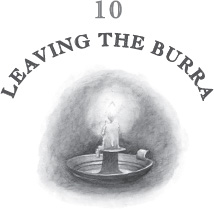
By next morning Nellie had made up her mind.
‘Is there a way I might get back to Adelaide, apart from the coach?’ she asked Mrs Trelawney as they washed the dishes in a bucket of creek water. ‘There must be another way that doesn’t cost so much.’
Mrs Trelawney stood and thought, a dirty tin plate in one hand and her bunch of scouring twigs in the other.
‘There’s the teamsters,’ she said at last. ‘They could give you a lift as far as the Port Wakefield turn-off. Not that I like the idea of a young girl travelling with those Irish beggars,’ she added. ‘They’re a rough lot, mostly, although Dan Murphy is all right.’
‘I can look after myself, sure,’ said Nellie. ‘But why would I want to travel with a team of bullocks? They go slower than a one-legged dog.’
‘True, they are slow,’ Mrs Trelawney admitted. ‘About a mile an hour is all they’ll do, and that’s on a good day.’
‘I can walk much faster than that,’ Nellie said. ‘I’d be at the turn-off ahead of them.’
‘You probably would, my lamb,’ said Mrs Trelawney. She looked at Nellie. ‘So you are thinking of leaving us.’
‘Yes, ma’am,’ Nellie said. ‘I mean to go tomorrow. I can’t stay with you any longer. You’ve been kindness itself, but I must go back to my friend Mary in Adelaide. I know she’ll be missing me.’
‘You may leave whenever you like, lambkin, but I insist on your taking the coach,’ said Mrs Trelawney. ‘I shouldn’t be happy letting you go, otherwise.’ She wrinkled her nose. ‘Is that smoke? Drat those boys, they’ve snuffed our chimney pot again. Why can’t they find something else to entertain themselves? Run, Nellie!’
Nellie scrambled up the path. While she was shooing the boys away from the dug-out chimneys, she saw in the distance a familiar figure in a long blue coat.
‘Li!’ she cried joyfully. She waved, and started to run towards him. But when she drew closer, she realised that it wasn’t Li after all: it was a much older man. He was slightly stooped, and his pigtail was grey.
Oh, I expect it’s Li’s uncle, she thought, disappointed. He looks quite old, and it must be a long way he’s walked from his vegetable garden. I suppose he’s used to it, though: didn’t Li say he’d walked to the Burra all the way from Adelaide?
Then she stood still, looking at Li’s uncle without seeing him. A bubble of excitement rose inside her. Suddenly she’d had a great idea.

Nellie crawled out from under her sugar-bag quilt while it was still dark, and bundled up her few things.
Candlelight flickered in the main room of the dug-out. Bob was on early shift at the mine, and was eating porridge at the kitchen table while his wife prepared his midday dinner. This morning there was a second dinner on the table, ready to be tied into its square of cloth: several slices of bread and dripping, two Cornish pasties, a wedge of treacle tart, a hunk of cheese and a bottle of water.
‘That should see you right for the coach journey, my lamb,’ Mrs Trelawney said. ‘And I’ll start you off with some porridge. Always begin the day with a full belly, that’s my motto.’
Nellie forced the porridge down. It was hot, and warmed her body, but she was so nervous that she had very little appetite.
Jesus, Mary and Joseph, why am I leaving these lovely people? she wondered. The bubble of excitement had disappeared overnight, and at that moment she would have given almost anything to stay here in the dug-out. It was cosy, and safe, and familiar. But of course she knew why she was leaving. She needed to be with Mary. And she needed to find work.
Surely by now there’d be something for her in Adelaide. She didn’t have to rely on the Immigration Depot for employment – there’d be other places. Perhaps she could work at the Infirmary. She’d ask that doctor if he might have a job for her. The place could do with a good clean. And if she worked at the Infirmary, she’d be close to Mary every day. That thought made her feel quite cheerful, and the last few spoonfuls of porridge went down more easily.
It was hard to say goodbye to Bob Trelawney. He took both Nellie’s hands in his own big calloused ones and then pulled her to him in a huge hug. The hug reminded her so vividly of her dada that her heart ached with missing him.
How can I bear it? she thought. I’m always going away from the people I love, or else they’re going away from me.
She watched Bob trudging off down the creek-bed until he disappeared around a curve in the bank. It felt to her as if her dada was leaving her all over again, and once again she saw her dada’s thin face and the terrible sadness in his eyes. She knew she would remember that face till the day she died.
Mrs Trelawney’s arm around her waist brought her back to reality. ‘Well then, Nellie,’ she said. ‘The coach will be leaving soon, so it’s time we parted, too. You’re a good girl, and I’ll miss you.’ She kissed Nellie on the cheek. ‘Here’s something to help smooth the way.’
Nellie looked at the coin Mrs Trelawney had slipped into her hand. It was a silver shilling, and Nellie knew there weren’t many spare shillings in the Trelawney household. The ache in her heart grew stronger. ‘Sure, you mustn’t – you’ve been so kind to me. Why, if it weren’t for you I’d be dead and buried …’ She tried to say more, but choked on the words.
‘There, my lamb. You were worth the saving, and we were happy to help. Off you go, now. God be with you, Nellie dear.’